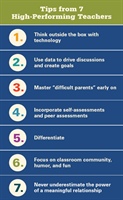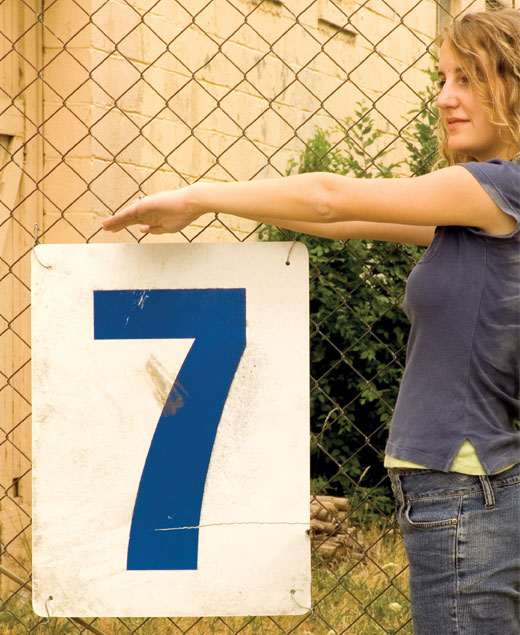The seven highest-performing teachers at our school spent time reflecting about their experiences and the lessons they learned during the past year. Their reflections are compiled here into several tips for more effective instruction:
1. Think outside the box with technology. Incorporate digital storytelling, virtual field trips, academic podcasts, blogging, virtual guest speakers, and Skype sessions with classrooms across town, across the state, and across the nation. Technology is no longer used to enhance today’s lesson, it is today’s lesson!
2. Use data to drive discussions and create goals. Review formative and quarterly assessments several times a week, dissecting the data associated with your discipline. Recognize that data analysis is more than a teacher issue, it’s a student issue as well. Have interactive data walls where students look for trends, identify individual and group goals, and then create meaningful ways to reach those goals.

3. Master “difficult parents” early on. Be purposeful when it comes to all parents, but pay special attention to those who may present themselves as difficult. Create a reminder to reach out to difficult parents on a weekly or bi-weekly basis. Vary how you build relationships with a parent: send a positive email, write a kind letter, make a mid-day phone call, and send texts praising the student. Be available and easily accessible.
4. Incorporate self-assessments and peer assessments. Teach students the value of and the process of assessing their own work, making changes, allowing peers to critique their work, and implementing revisions as needed. Regular assessment improves academic performance, whether it’s traditional methods such as paper and pencil or more modern techniques such as online assessments and virtual assessments with peers across the hall, at different schools, and across the state.
5. Differentiate. Differentiate as you consider the academic, social, and emotional needs of all, some, and one. Scaffold the instruction so gifted learners have a higher level of independence, average students have a balance of guidance and freedom, and struggling learners can benefit from more one-on-one assistance with additional monitoring, probing, and individualization.
6. Focus on classroom community, humor, and fun. There is more to a successful classroom than academics. Never be afraid to let your students see the “real” you. You don’t want to be their friend, but you do want them to see your humorous side, know that you genuinely care about them, and recognize that you value what they have to offer individually and as part of the classroom community. You will improve student achievement, but also benefit from a sense of fulfillment as a whole.
7. Never underestimate the power of a meaningful relationship. Despite all the new and innovative techniques that we discover and modify, certain practices continue to yield as much success today as they did decades ago. One of those techniques is the focus on significant, meaningful relationships between student
and teacher.
Finding and building on common ground, offering specific feedback, praising students inside the classroom, visiting students outside the classroom, and letting students see that you refuse to let them fail makes all the difference in the world. Students work harder, act better, and do more for the teachers who work every day to build a meaningful relationship with them.
James Davis, a former principal, assistant principal, and classroom teacher, is an associate professor at High Point University, in High Point, North Carolina. jdavis@highpoint.edu
